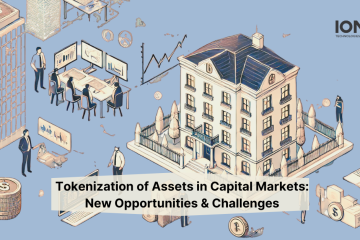
Companies across various industries are exploring blockchain technology’s potential to make supply chains more efficient and trackable. I have previously written about how the blockchain could impact supply chain management. In this article, I will highlight how logistics are currently managed and where blockchain solutions are most likely to be adopted.
Complex, International Supply Chains
Currently, a large company’s supply chain is more likely to resemble an entangled web than a streamlined linear process. Though globalization has allowed for more efficient cross-border movement of goods and services, in many cases, it has also lengthened supply chains. Dealing with a large number of domestic and international entities and strenuous documentation procedures necessarily creates friction in logistics. International payments can take a couple of days to process. Ships, barges, trucks, and railcars often prove difficult to track. However, going back to shorter supply chains is often prohibitively expensive. Companies are therefore turning to blockchain technology to keep track of numerous entities, to store and quickly exchange documentation, to track transportation vessels, and to instantly settle payments.

Complex international and intermodal transportation networks often prove difficult to track.
The Blockchain Solution
A blockchain is a distributed, public ledger that cannot be changed except through a specified consensus mechanism that requires the cooperation of many nodes. Since it is public, it can promote transparency. Since it is distributed, it is tamper-proof and therefore trustworthy.
Automation of Contracts and Payments
Transactions on the blockchain can be settled instantly. Smart contracts (self-executing contracts written in code and often designed to have any funds or information included within the code of a contract itself) have the potential to automate transactions across entire supply chains. For example, a smart contract could release a certain quantity of funds upon the receipt and verification of a document showing that a shipment of goods has changed hands.
Improved Traceability and Security
Sticking with the example above, once the goods are exchanged and a smart contract settles the required payment, the change in the possession of the goods and the flow of funds is reflected on the public ledger. Due to the distributed nature of the ledger and security mechanisms such as hashing and encryption, the new data cannot be tampered with. Thus, anybody with access to the blockchain’s ledger will be able to track where and in whose possession the goods are. Companies could use this tracking function internally, or even allow customers to track ordered goods (or even the components of the goods).
Getting on the Same Page
Since blockchain technology is relatively new, various competing blockchain platforms exist. To fully realize the benefits of speed, transparency, security, and accessibility of data, suppliers, manufacturers, vendors, retailers, agents, and consumers should ideally be on the same platform, or at least an interoperable platform. Various efforts are underway to achieve blockchain interoperability (some of which I have previously discussed), but there is not currently an industry leader. Still, many organizations are experimenting with the adoption of blockchain technology to improve logistics.
Accenture Patent and Partnerships
An Accenture patent application in the US, dated July 26, 2018, describes a device that “may receive an indication that a product has arrived at a destination” and “may perform an analysis on the product to determine an attribute of the product.” The described device is likely part of Accenture’s plans to lay a physical infrastructure for its blockchain solution for supply chains. Accenture has also partnered with French company Thales to develop an aerospace blockchain tool, and separately with logistics company DHL to limit tampering in pharmaceutical supply chains. These moves indicate that Accenture is seeking to position itself as a leader in full-service blockchain solutions for supply chain management.
Commonwealth Bank of Australia trades Almonds on the Blockchain
Last month, an Australian bank moved 17 tons of almonds from Australia to Germany using the Ethereum blockchain network. The transaction involved “five domestic and international supply chain leaders” and combined various software and hardware elements to track the whereabouts, contractual status (including payments, documents, and operations), and physical attributes (such as temperature and humidity) of the shipment every step of the way.

Almonds were exported from Australia to Germany using the Ethereum Blockchain for tracking.
Conclusion
Since increased transaction settlement speed and transparency in its logistics could give a company a massive competitive edge, we can expect rapid development in the adoption of blockchain technology for logistics. In today’s unforgiving global competitive landscape, a failure to adopt a major new technology can have devastating consequences.
However, companies with established records in logistics (such as UPS, FedEx, DHL, and major container shipping lines) cannot risk losing customer trust by implementing a half-baked blockchain solution in place of tried and tested tools. This opens up space for start-ups and entrepreneurial coalitions of unrelated hardware, software, and process companies to become first-movers in the supply chain space. Organizations that quickly, thoroughly, and skillfully deliver blockchain-enabled logistics solutions can expect outsized rewards.
Can blockchain add a layer of security and transparency to your supply chain processes? Explore the potential that blockchain holds for the logistics and supply chain industry with us. Get in touch.
This blog is originally published here, https://medium.com/blockstreethq/optimizing-logistics-with-blockchain-technology-34a1ba83130
Author Bio:
 Shaan Ray is a technology researcher and Web3 specialist who helps organizations unleash the power of emerging tech in reshaping their business goals. Under his mentorship, companies embrace transformative solutions to tap new markets and fresh customer segments. Shaan specializes in Blockchain technology, enterprise cryptocurrencies, and international business. Shaan can be reached at Linkedin, Facebook, Twitter and Instagram.
Shaan Ray is a technology researcher and Web3 specialist who helps organizations unleash the power of emerging tech in reshaping their business goals. Under his mentorship, companies embrace transformative solutions to tap new markets and fresh customer segments. Shaan specializes in Blockchain technology, enterprise cryptocurrencies, and international business. Shaan can be reached at Linkedin, Facebook, Twitter and Instagram.


